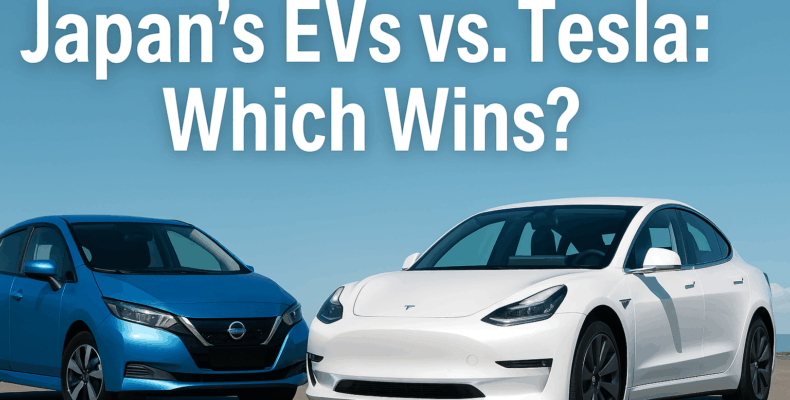Electric vehicles (EVs) are rapidly changing the global automotive market. Tesla is often viewed as the leader, especially in North America and Europe, while Japanese automakers such as Nissan, Toyota, and Honda are making steady, tech-savvy progress. But which is better? In this article, we compare Japan’s EVs and Tesla in terms of technology, range, pricing, availability, and long-term value.
1. EV Technology and Innovation
Tesla: Leading the EV Revolution
-
Industry leader in battery technology and autonomous driving
-
Over-the-air software updates and full self-driving capabilities (in beta)
-
Fast acceleration and advanced infotainment systems
Japan: Reliable and Practical Advances
-
Focus on safety, hybrid evolution, and EV reliability
-
Nissan Leaf pioneered mass EV adoption
-
Toyota invests heavily in solid-state battery R&D and hybrid-EV synergy
Conclusion: Tesla leads in innovation and tech, while Japanese EVs prioritize stability and dependability.
2. Driving Range and Charging Infrastructure
Tesla
-
Long-range options: up to 600+ km per charge (Model S)
-
Supercharger network supports fast and convenient charging
-
Still facing infrastructure limitations in some countries
Japanese EVs
-
More conservative range (e.g., Nissan Leaf: ~300 km, Honda e: ~220 km)
-
CHAdeMO and CCS charging compatibility
-
Strong support from government-backed charging networks in Japan and Asia
Conclusion: Tesla has better range and faster charging, but Japan’s infrastructure is growing steadily.
3. Pricing and Value
Tesla
-
Premium pricing, especially for Model S and Model X
-
Model 3 and Model Y offer better affordability but still above many Japanese EVs
-
Higher insurance and repair costs
Japanese EVs
-
Competitive pricing for models like Nissan Leaf, Honda e, and Toyota bZ4X
-
Lower maintenance costs
-
Hybrid-EV options provide flexibility for uncertain markets
Conclusion: Japanese EVs win in affordability and practical value.
4. Global Availability and Support
Tesla
-
Strong presence in the U.S., Europe, and China
-
Limited service centers in smaller markets
-
Fast global expansion in progress
Japan
-
Nissan and Toyota have extensive international dealer networks
-
Better parts availability in many Asian, African, and South American countries
-
More variety in vehicle sizes and applications (e.g., kei-EVs)
Conclusion: Japanese brands offer more global service support and flexible sizing options.
5. Resale and Long-Term Reliability
-
Tesla vehicles often maintain high resale value due to brand strength and demand
-
However, concerns exist around battery degradation and repairability
-
Japanese EVs are valued for reliability and long-term cost-effectiveness, especially in hybrid markets
Trusted Exporters of Japanese EVs and Hybrids
If you are interested in importing a reliable Japanese EV or hybrid vehicle, working with an experienced exporter is crucial. Here are some trusted names:
-
EVERY Co., Ltd.
Based in Niigata, EVERY has exported used EVs, hybrids, and commercial vehicles to over 100 countries since 2006. Known for detailed inspection, quick response, and full export support.
➤ https://www.everycar.jp/ -
SBT Co. Ltd.
Offers a wide range of Japanese EVs and hybrids with global logistics support. -
Be Forward
Popular for electric and plug-in hybrid listings, especially across Africa and Southeast Asia. -
Qualitex Trading
Specializes in clean and affordable hybrid/EV models. -
Autorec Enterprise Ltd.
Long-standing experience in handling hybrid exports and maintenance support.
➤ Read more here:
Top Recommended Japanese Used Car Export Companies for International Customers
Final Thoughts
Tesla shines when it comes to innovation and EV leadership, but Japan’s EVs offer better affordability, reliability, and global support. The best choice depends on your local infrastructure, budget, and how you plan to use the vehicle.
In our next article, we’ll cover “Top 5 Used Japanese EVs for First-Time Buyers.”
